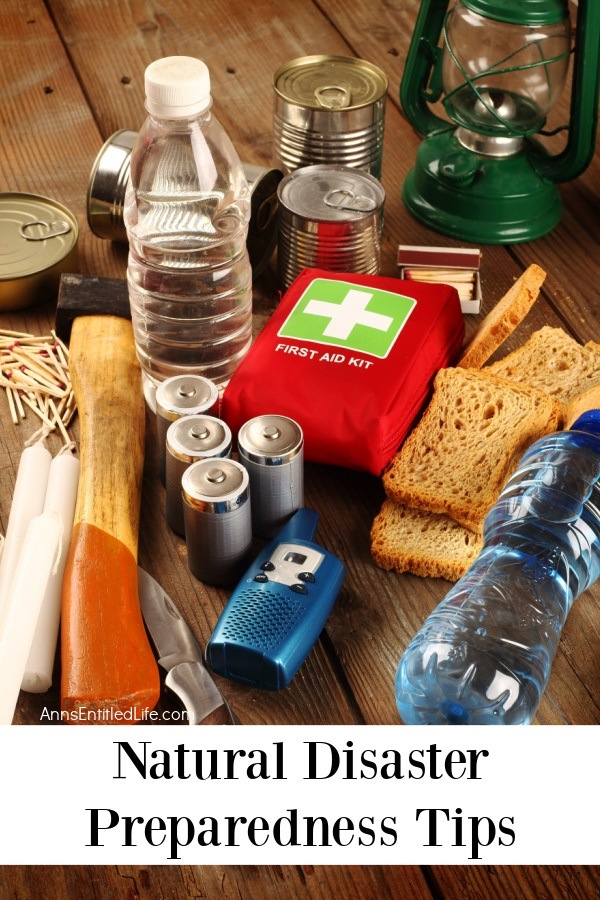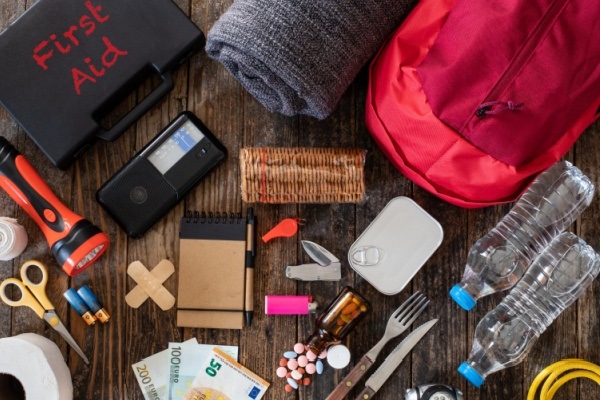A list of tips, tricks, and goods to have on hand in case of a natural disaster.
Natural Disaster Preparedness Tips
Be prepared the next time a natural disaster strikes.
A few years back, we were hit with an “October Surprise” snowstorm. Through some freak weather conditions, snow and freezing rain came down one October night. Rain changed to ice pellets which finally changed to heavy snow. Since the trees had not dropped their leaves – as a matter of fact, they were at full peak – it was a complete disaster. Tree limbs broke in loud snaps, dragging down power lines leaving hundreds of thousands of people without power.
Hubby was out of town on business, and after listening to me tell him how bad it was, took a red-eye home from California. When he arrived, I was just on my way out to go hunt down a portable generator. Hubby called around a bit and located one in Cleveland. There were none left between here and Rochester, and nothing in Erie, PA either.
It took an entire week for us to get power back, and in that time, I learned a lot about how wonderful having a stockpile can be!
Things I learned about emergency preparedness:
● I will (probably) never live in Florida year-round. Yup, this was #1. It took over a week to get back the power to most of the homes in my area (we were day 7, and no, I was not happy that the street next to me had power back on day 2), and that was with power workers from two countries: The US (13 different states) and Canada (2 different provinces) working around the clock. My aunt (and cousin) live in Ft Lauderdale and, during one hurricane not too long ago, were without power for three weeks! My area is pretty easy to access, as evidenced by all the power companies helping from different states, and it still took over a week for everyone to get power back, but it is a looooong drive down to the bottom of Florida, even longer when you are awaiting help. I want to live in an area where help can get to me quickly and easily if a natural disaster occurs.
● I am a product of the 20th and 21st centuries. I like creature comforts like electricity, heat, and water that does not have to be boiled.
● When the electric went out, I was very glad to have our Coleman 5 day cooler. However, not all the meat we had in the freezers would fit in our two coolers. The first day was fine, it was cold out, and there was snow, but all the snow melted the next day when it went back up to nearly 60°! My old house in Buffalo never lost power. Only four houses in that area had power, my old house, one neighbor, and two houses across the street – and one of those houses was owned by my ex-SIL. As soon as the travel ban was lifted, Sonny-boy was sent to her house with as much food as her freezer and refrigerator could hold!
● We are fortunate to have a fireplace. Sonny-boy and I got the sleeping bags out, built a fire, and kept reasonably warm. When hubby came home, Sonny-boy lasted one more night at home, then made that delivery of food to his aunt and never came back until the power turned on. I can’t say I blamed him.
● Natural gas is good. Sure we have an electric start on our gas stove, but a lighter solved that problem quickly enough.
● Whole. House. Generators. That was my mantra after that storm. There are fourteen houses on my street, and five had whole house generators before the storm hit. Now, four houses on my street do not have one. We got ours the following summer.
● Timing is everything. This storm started in the early evening on a Thursday, so most of the area closed down on Friday. By Monday, businesses were open, and people returned to work.
● The trees were decimated, and the wood chips from those trees would fill the local football stadium to over 70 stories. In the fifteen years since then, they have come back beautifully.
Emergency Preparedness Kit Items
● Fema has an emergency preparedness kit list.
Basic Disaster Supplies Kit
You can purchase a Disaster emergency kit or make your own.
A basic emergency supply kit could include the following recommended items:
● Water, one gallon of water per person per day for at least three days, for drinking and sanitation
● Food, at least a three-day supply of non-perishable food
● Battery-powered or hand-crank radio and a NOAA Weather Radio with tone alert and extra batteries for both
● Flashlight and extra batteries
● First aid kit
● Whistle to signal for help
● Dust mask to help filter contaminated air and plastic sheeting and duct tape to shelter-in-place
● Moist towelettes, garbage bags, and plastic ties for personal sanitation
● Wrench or pliers to turn off utilities
● Manual can opener for food
● Local maps
● Cell phone with chargers, inverter, or solar charger
Additional Emergency Kit Supplies
● Prescription medications
● Glasses
● Infant formula and diapers
● Pet food and extra water for your pet
● Cash or traveler’s checks and change
● Important family documents such as copies of insurance policies, identification and bank account records in a waterproof, portable container. You can use the Emergency Financial First Aid Kit developed by Operation Hope, FEMA, and Citizen Corps to help you organize your information.
● Emergency reference material such as a first aid book.
● Sleeping bag or warm blanket for each person. Consider additional bedding if you live in a cold-weather climate.
● Complete change of clothing including a long-sleeved shirt, long pants, and sturdy shoes. Consider additional clothing if you live in a cold-weather climate.
● Household chlorine bleach and medicine dropper – When diluted, nine parts water to one part bleach, bleach can be used as a disinfectant. Or in an emergency, you can use it to treat water by using 16 drops of regular household liquid bleach per gallon of water. Do not use scented, color-safe or bleaches with added cleaners.
● Camping lanterns (you can now get them solar)
● Fire extinguisher
● Matches in a waterproof container
● Feminine supplies and personal hygiene items
● Mess kits, paper cups, plates, paper towels, and plastic utensils
● Paper and pencil
● Books, games, puzzles or other activities for children
Have you ever lived through a natural disaster? What type? And what recommendations do you have for a kit for people in your area?
● If you enjoyed this post, be sure to sign up for the Ann’s Entitled Life weekly newsletter, and never miss another article!
● For more Library Reading from Ann’s Entitled Life Click here



Candie says
Being from Massachusetts I have lived through a hurricane. Now that I live on Texas, tornadoes. Scare me to death. I have been in several that caused extensive damage, death, downed power lines. I have a small box with batteries, flash lights, money, jugs of water, some canned food, can opener, clothes, a solar cell phone charger and Bridgette’s food. I wouldn’t be able to start a generator. I have been in s flood here in Texas and we have just started experiencing small earth quakes.
admin says
Candie I couldn’t start the portable generator either. Sonny-boy or Hubby had to do it.
Ann
Judie Nelson says
As a survivor of hurricane Camille many years ago we were without power for almost 6 weeks, so to your emergency list I would add: laundry detergent, clothes line and clothes pins, fabric softener, something large enough to do laundry in (I used our bathtub) and a sink plunger (yes for doing laundry). This is especially important if you have small children
admin says
I can’t imagine not having power for six week, Judie! You are a real survivor.
Ann
Liz says
Really just two hurricanes here in recent memory, hurricane Irene and hurricane or superstorm sandy – whatever they call it. Irene, we were out of power 1 week but it was August. No biggie. But sandy, it was the end of oct, November. We were out of power for 2 weeks and no heat. The no heat or hot water was a problem with little kids. We had move to my in laws in queens when the temperature dropped to 30’s. there was also a snowstorm in there before we got our power back. Most of my neighbors got a gas fireplace since then. I’d love to get that. We only have a small generator for now. Flashlights, clothes, blankets, lots of bottled water were all useful to use.
admin says
Sandy was horrible for you Liz. We mostly missed it, and I am not ashamed to say I was grateful we did.
Ann
Tedd says
Always have your emergency lamp ready in the house in case power electricity is cut out, candles will also help. You’ll never know how many days will pass by without electricity. So better be ready as always.